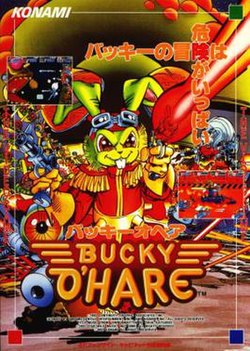Gameplay
This video game is based on the cartoon television series Bucky O'Hare and the Toad Wars under license from Hasbro, Inc. While it is generally classified as a scrolling beat 'em up game, as the player's character is also armed with a laser gun, it adds elements of a scrolling shooter.
Much like the cartoon, Bucky O'Hare features colorful animation, and voice actors from the series were hired to participate in the game's cut scenes.
The player chooses from four protagonists: Bucky O'Hare, the heroic rabbit captain of the space ship Righteous Indignation; Jenny, an "Aldebaran cat" and telepath; Dead-Eye Duck, a four-armed mallard; and A.F.C. Blinky, a one-eyed android. As in the television series, the characters must stop the Toad Empire from invading extraterrestrial planets and enslaving their peoples; to do so they must shoot their way through an army of brainwashed toads to destroy their evil leader, a computer program known as "Komplex" and release the "Interplanetary Life Force".
The enemies in the game are Al Negator, Toadborg, Total Terror Toad, a "Cyborg Spider", the various varieties of Toad Storm Troopers, the Toads' Air Marshall, and "Komplex-2-Go", who are featured in the comic book and cartoon series continuities.
This page is based on this
Wikipedia article Text is available under the
CC BY-SA 4.0 license; additional terms may apply.
Images, videos and audio are available under their respective licenses.
